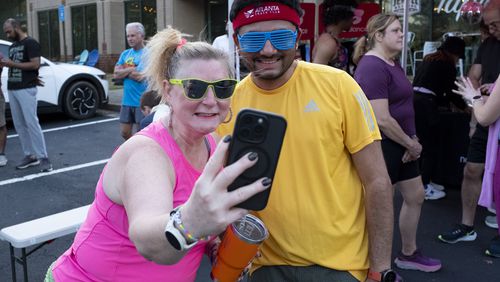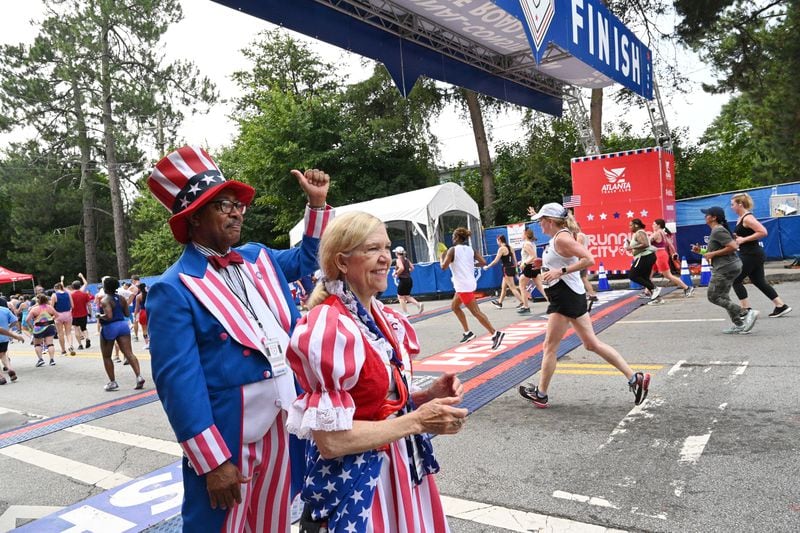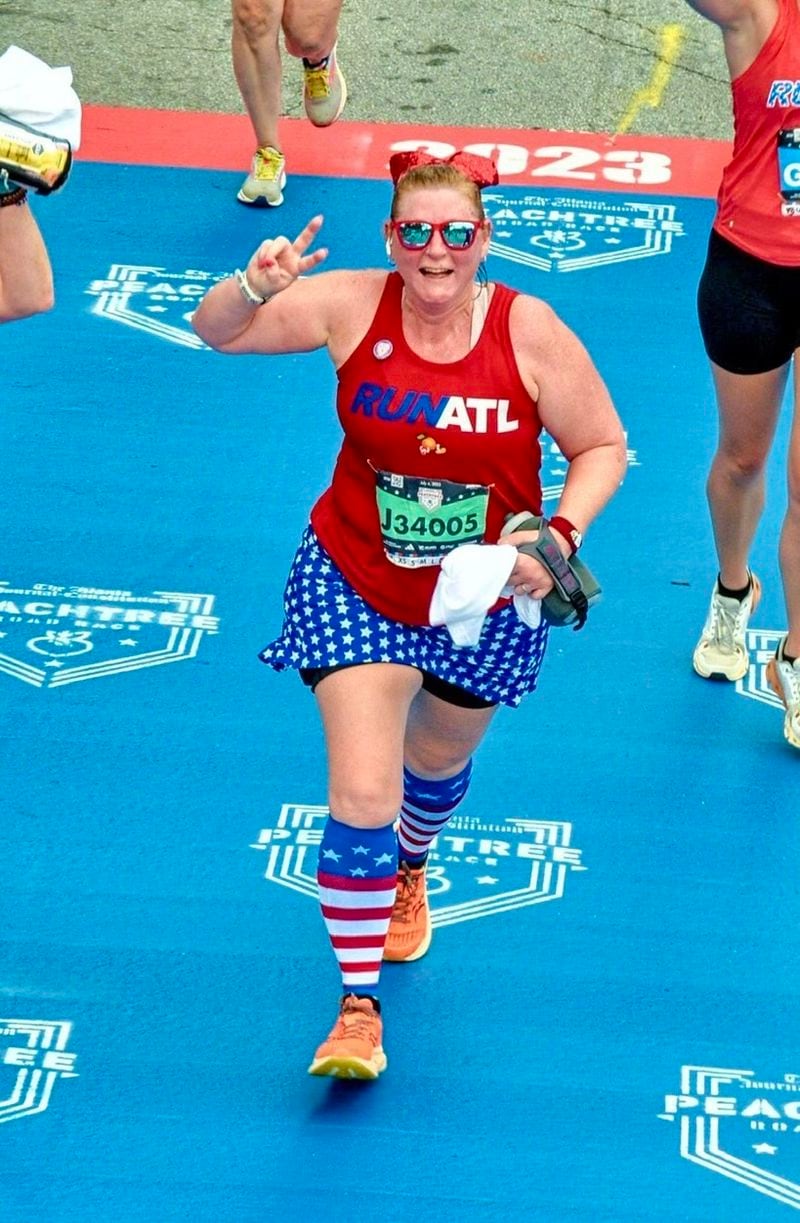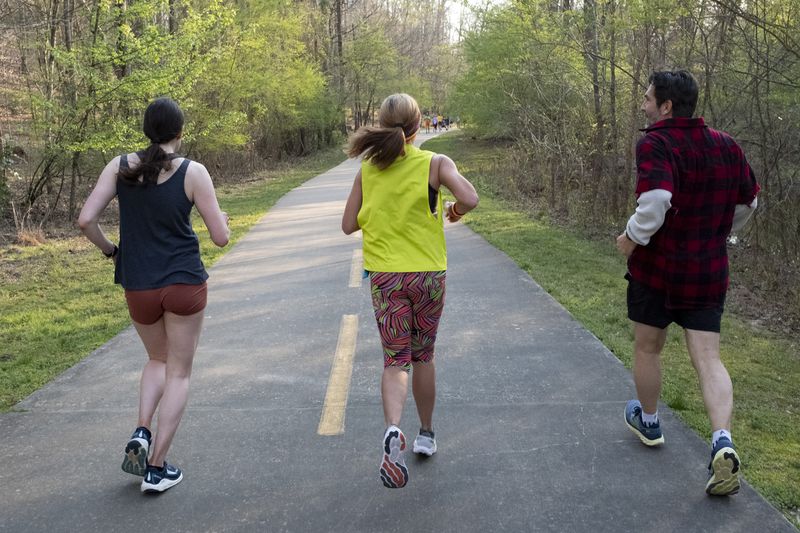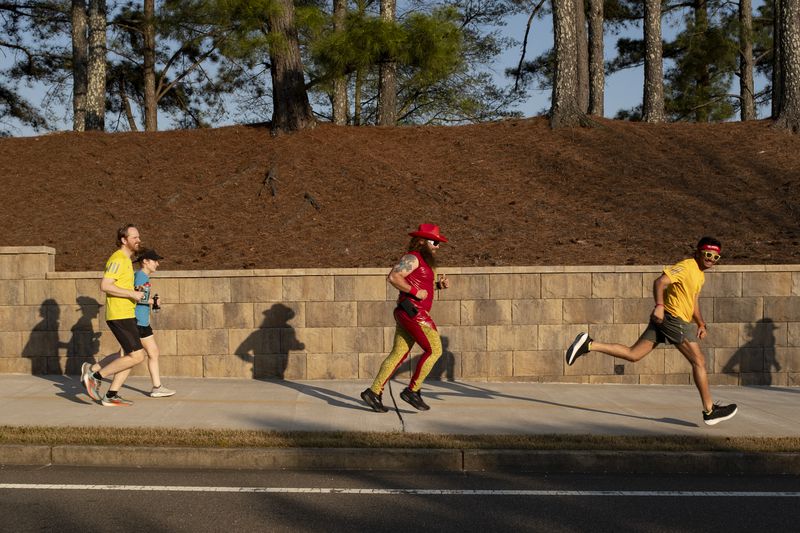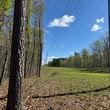The Atlanta Journal-Constitution Peachtree Road Race is more than a 10K race. It’s a patriotic party, an enduring symbol of Atlanta.
But it’s still a race — a challenging one famous for its “heat, hills and humidity.”
So you may be wondering if you can participate in this race along the city’s signature street — especially if you’re not a runner. And what if you are over 50?
Wonder no more. You can do it, even if you have never run a day in your life. But the time to start is now.
“One of the keys, clearly, is to commit to consistency,” said Atlanta Track Club’s running coach Bob Wells. “You don’t want to kick this can down the road so that all of a sudden you wind up in June and you’re like, ‘Now I have to make this giant jump.’”
Credit: HYOSUB SHIN / AJC
Credit: HYOSUB SHIN / AJC
Carol Walsh, who ran her first mile at age 55, is testimony to this approach.
Walsh, formerly of Providence, Rhode Island and now living in Johns Creek, started out by running from one utility pole to the next until, little by little, she could run the full 6.2-mile distance of the Peachtree race.
Now age 71, Walsh has run in five Peachtrees and is a member of a running group in Alpharetta that provides support to keep her running goals on track.
Her goal this year is to “Finish the race, beat my time last year and don’t be last, please.”
Walsh admits that she doesn’t always love practice runs or even the Peachtree itself but running gives her a sense of accomplishment and helps her live an active, healthy lifestyle.
“Sometimes when I am running, I am like, ‘What I am doing?” said Walsh. “But when I see that finish line, I am like a kid in a candy store.”
Walsh is part of a trend reported by industry association Running USA: a rise in the past decade of runners over the age of 55. Runners between the ages of 50 and 59 now represent the largest share of runners in the Peachtree race.
Kim Jenkins of Alpharetta got back into running at 51 last July after a hiatus lasting two decades. Her return to running started with joining a running group.
“I was an empty nester and needed a positive distraction so I thought this would be a good way to get my mind off of it and do something positive,” said Jenkins, who has run two marathons already this year.
She has signed up to run her first Peachtree race.
“If you have it in your heart you want to do this, you can absolutely do this,” said Jenkins. “It’s an action you have to take but you have to have the desire to do it.”
As Jenkins and Walsh prove, there is no age limit to running. And one thing all runners have with the race still months away — is time.
In recent interviews with The Atlanta Journal-Constitution, local running coaches Bob Wells with Atlanta Track Club and Paige Mack, a running coach with the Big Peach Running store in Alpharetta, share their top tips for getting ready for the Peachtree.
Credit: custom
Credit: custom
Before starting a new running routine, it’s a good idea to check in with your body about any lingering aches and pains and then check in with your doctor for the green light. This is especially true for older runners.
Get the right shoes and gear. Don’t dust off a pair of old sneakers in the back of your closet. Take your time trying four or five pairs of running shoes to find shoes that are “super comfortable.”
Wear moisture-wicking apparel, including socks, shorts and shirt. Moisture-wicking fabrics pull the sweat away from your skin allowing it to evaporate quickly, helping keep your skin dry and comfortable.
Know your ability: For those new to running or who normally only run short distances, don’t even think about running the full 6.2 miles right away. Pushing yourself too hard sets you up for failure and injuries.
Start slow. For non-runners, start with a distance of a quarter-mile or simply time yourself and run 20 to 30 seconds at a time, walking in between. Little by little, gradually increase the distance and time spent running.
Galloways’ run-walk-run method: There is a reason why Jeff Galloway’s run-walk training method is so popular. It’s beginner friendly and works. Developed by Galloway, a renowned Olympian who won the very first Peachtree Road Race in 1970 and is now a running coach, the method offers a simple strategy: Instead of running continuously for a given distance, alternate running and walking. While Galloway offers an online tool to help determine customized ideal intervals, there’s no set rules on duration and timing.
But someone new to running might start with running only 5-10 seconds and then walk the rest of a minute. Over time, and week after week, the runner gradually increases the time spent running. It’s fine to use a run-walk method on race day too.
For those who are more experienced runners but who typically run only three miles at a time and without the steep hills found on the Peachtree course, the approach is similar, adding a quarter-mile each week. Find a running route with hills to help prepare you for the race and its infamous “Cardiac Hill,” which climbs more than 12 stories in less than a mile.
Train walking and running on hills: Mack recommends runners practice walking fast up hills. The main goal, she says is to walk up the hills fast “without feeling completely exhausted.” Eventually, if you are comfortable running non-stop up the hill, go for it.
Take a break if you feel pain: So you’re in a groove, but something hurts.
Discomfort is OK. But if you’re in pain — whether it’s in your knee, your hip, your ankle, anywhere really, Wells says be smart and take three days off.
If the pain is due to strain or overuse, three days off will allow the injury to start healing and reduce further damage. After three days, you can resume a small amount of running. But if the injury still hurts when you exercise again, Wells recommends you make an appointment with your doctor to find the cause of the injury.
But don’t stop if it’s just discomfort: “Running is hard and that’s why most people don’t do it,” said Wells. “But on the flip side, it’s not unlike anything else that, if you want to be good at it, you have to practice.” In other words, don’t give up.
Reward yourself: Maybe your milestone is three miles, or maybe it’s a time goal, but when you reach it, Wells recommends you reward yourself. Whether it’s an ice cream or a manicure, you choose but it’s important to celebrate the achievements along the way.
Credit: Ben Gray
Credit: Ben Gray
Get a running buddy or join a running group: Running with partners provides accountability, meaning it’s a little harder to skip today’s run or to cut the planned distance short. Having friends to run alongside can have the happy effect of making even a hard run seem less difficult.
“Therein lies the power of the of the group,” Wells said. “We have many many athletes who come back to us and train with us for that very reason.”
Credit: Ben Gray
Credit: Ben Gray
Get off the treadmill: Mack advises runners to not do their training exclusively on a treadmill. Treadmill running is smooth, climate-controlled and unlike a sometimes grueling Peachtree race. Hit the road to practice running and hydrating in warmer temperatures.
Hydration is super important at any age. Especially for older runners. Older adults are at a greater risk for dehydration because of how body composition changes with age. Those in the 65-and-older crowd simply have less water in their bodies than younger adults or children. Decreased kidney function also can affect fluid levels.
Incorporate strength training: Another tip that’s particularly important for older runners: strength exercises. They can help counteract age-related muscle loss, enhance bone density and improve overall stability — a combination that can reduce injuries and help runners keep going into their golden years. Perform strength exercises at least twice a week, Mack said. She recommends FitbyMik on YouTube, led by a certified fitness instructor with workouts that are easy to follow.
Go at your own pace. “My mantra is: ‘My race, my pace,’” said Mack. Don’t compare yourself to other runners. Don’t feel guilty about walking during a race.
Keep your eye on the prize: Wells said while training for the AJC Peachtree Road Race might be challenging, try to focus on the positive. “I like to say the Peachtree is a celebration of life, health, family, friends, community, freedom, competition, and of course the T-shirt,” he said. “But at the end of the day, it should be fun, right? If you are not having fun, what’s the point?”
About the Author
